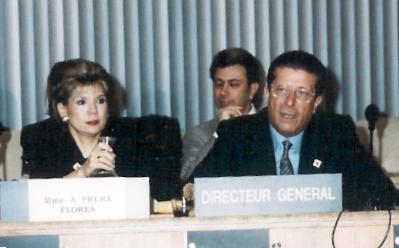Stories
National culture of peace programmes
Missions for the culture of peace
The failure of the culture of peace programme
Brothers for Peace
* * *
After developing the culture of peace programme at UNESCO as a consultant in 1992-1993 under his direction, I went to Director-General Federico Mayor in the 1993 and asked for a post in the organization.
He was skeptical: "You don't really want a post, David. Remain my consultant. You'll be better paid, and you won't lose your post at the university."
I replied that I had thought about that and was prepared to make the sacrifice (years later I would come to realize how much I lost in pension benefits). But I felt it was worthwhile because the programme could not be directed from the outside. I needed to be inside the system to make it work (George Kutukdjian had warned me that UNESCO was incapable of implementing a programme like this, but I wanted to take up the challenge.)
Then, Mayor gave me the ultimate reason. "If you get a post in the organization, you can never talk to me again!" He knew well the "culture of war" hierarchical system of UN organizations where lines of command are sacred and you cannot go over the head of your commanding officer (see my 1998 "inquisition".
But I was stubborn and insisted on a post, so he gave in. To this day, I don't know how he got around the normal procedures to get me the P5 post without the proper committee procedures.

Mayor with Anaisabel Prera, Enzo Fazzino in background, at meeting of
International Advisory Panel for Culture of Peace Programme in 1999
I was placed under the "command" of Leslie Atherley, an easy-going fellow from Barbados, with whom I got along well for the first couple of years.
But how could I communicate with Mayor?
When I first came to see Mayor at UNESCO in preparations for the Yamousoukro Congress in 1988, Mayor had given me a little book of his published poems called "En Tránsito." One of them, especially moving, was dedicated to Graça Machel at the funeral of her husband, the great revolutionary leader of Mozambique, who had been assassinated.
The answer was to communicate through poetry. Each time I went on mission, I would send a mission report to the Director-General and preface it with a poem. I wrote poems from El Salvador, from Mozambique, and later from Russia. One of the poems, after a mission to Mozambique, was dedicated to Graça Machel who was head of the Mozambican National Commission to UNESCO, and with whom I had the privilege to work. It included the lines:
"What is peace?"
We asked the old men.
. . . .
Peace is a tree.
Its roots are deep in our land.
. . . .
[click here for full poem]
A particularly amusing moment arose once when Mayor ordered his Chief of Cabinet, a very staid bureaucrat, to circulate one of my mission reports to the members of the UNESCO Executive Board. When my secretary delivered the mission report to him to be copied and distributed, he took one look at the poem on the first page and screamed out, "I refuse! I will not send a poem to the Executive Board!"
Mayor was correct when he said that I would no longer be able to see him. Twice during my ten years at UNESCO, I made appointments to see him over the head of my "commanding officer" and twice I was fired, once from the Division of Social Sciences which was hostile to the Culture of Peace Programme, and the other time from the Culture of Peace Unit when its programme had failed.
And twice I was reinstated with a new position. The first time Mayor removed the Culture of Peace Programme from the Social Science Division and put it under his personal direction, and the second time he removed me from the Culture of Peace Unit and set up a new unit for me to direct the International Year for the Culture of Peace. I tell people that if you want to make progress at the UN, you must be ready to risk being fired!
Mayor was a man of great contradictions. He was a megalomaniac, as I would often discuss in consternation with my psychoanalyst friend Perel. On the good side, he had a charming and inspiring charisma which came out most brilliantly when he was addressing large groups of young people. He had the courage of his convictions and was devoted to the dream of UNESCO to build the defences of peace in the minds of men. He read your memos as if devouring them, underlining and putting comments in the margins (I keep many of the originals in my archives).
On the bad side, he did not listen to you, especially to "bad news." "Never bring me bad news," he would say, "only good news." And he was capable of spending money like it was nothing and promising money that he did not have, while incapable of raising money. In his defense it should be said that there has never been money for peace, at least not for peace in the empowering rather than pacifying sense of the term. To fund our request of a million dollars for the International Year for the Culture of Peace, which was not in the budget, he did not raise extrabudgetary funds, but robbed the budgets of our colleagues to pay for it. Enzo and I were the "Robin Hoods" of the culture of peace, and hence hated by many of our "rich" colleagues who lost their funds to us.
 |
Stages
1982-1986
American Peace Movement
1986-1992
Seville and Peoples Peace Appeal
1992-1997
UNESCO Culture of Peace Programme